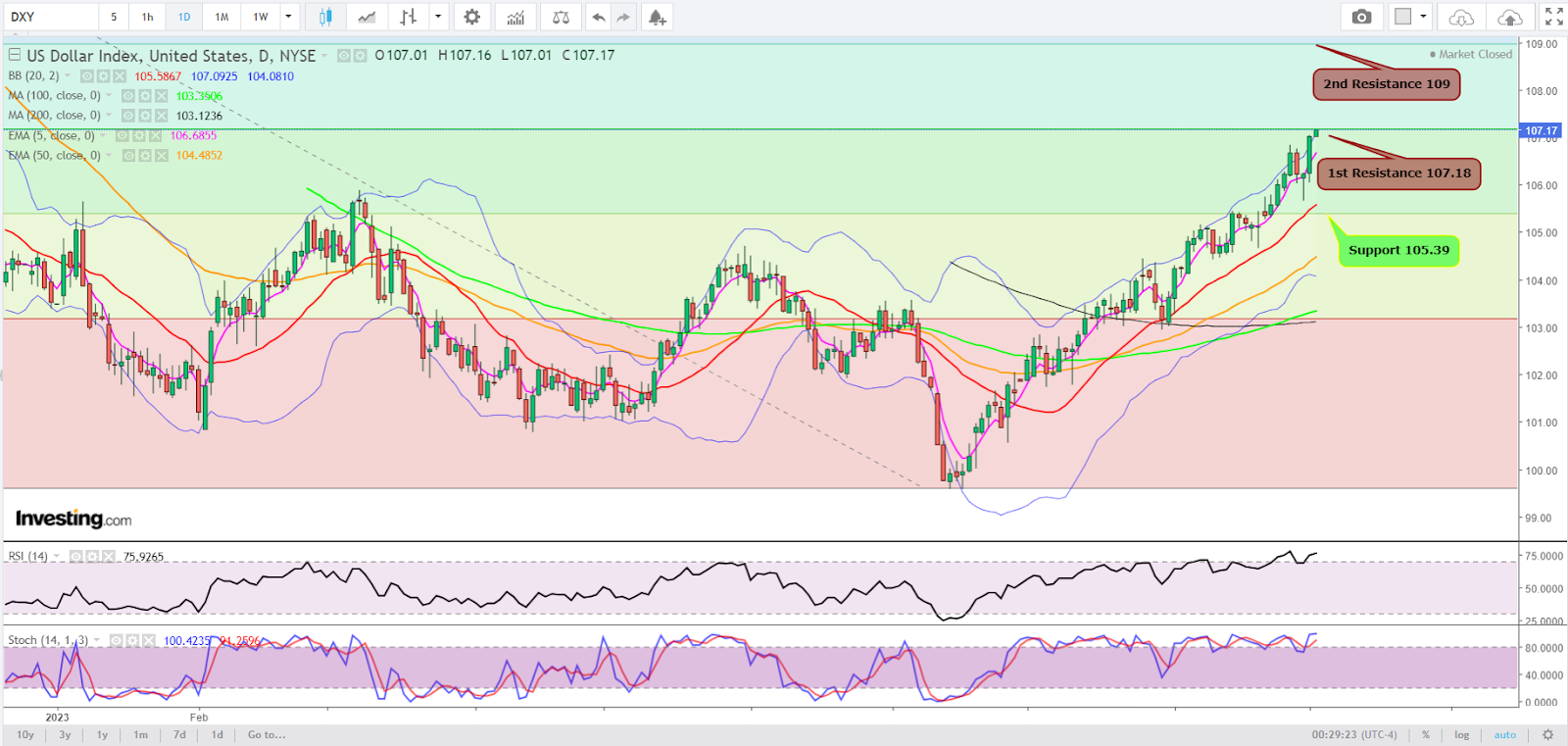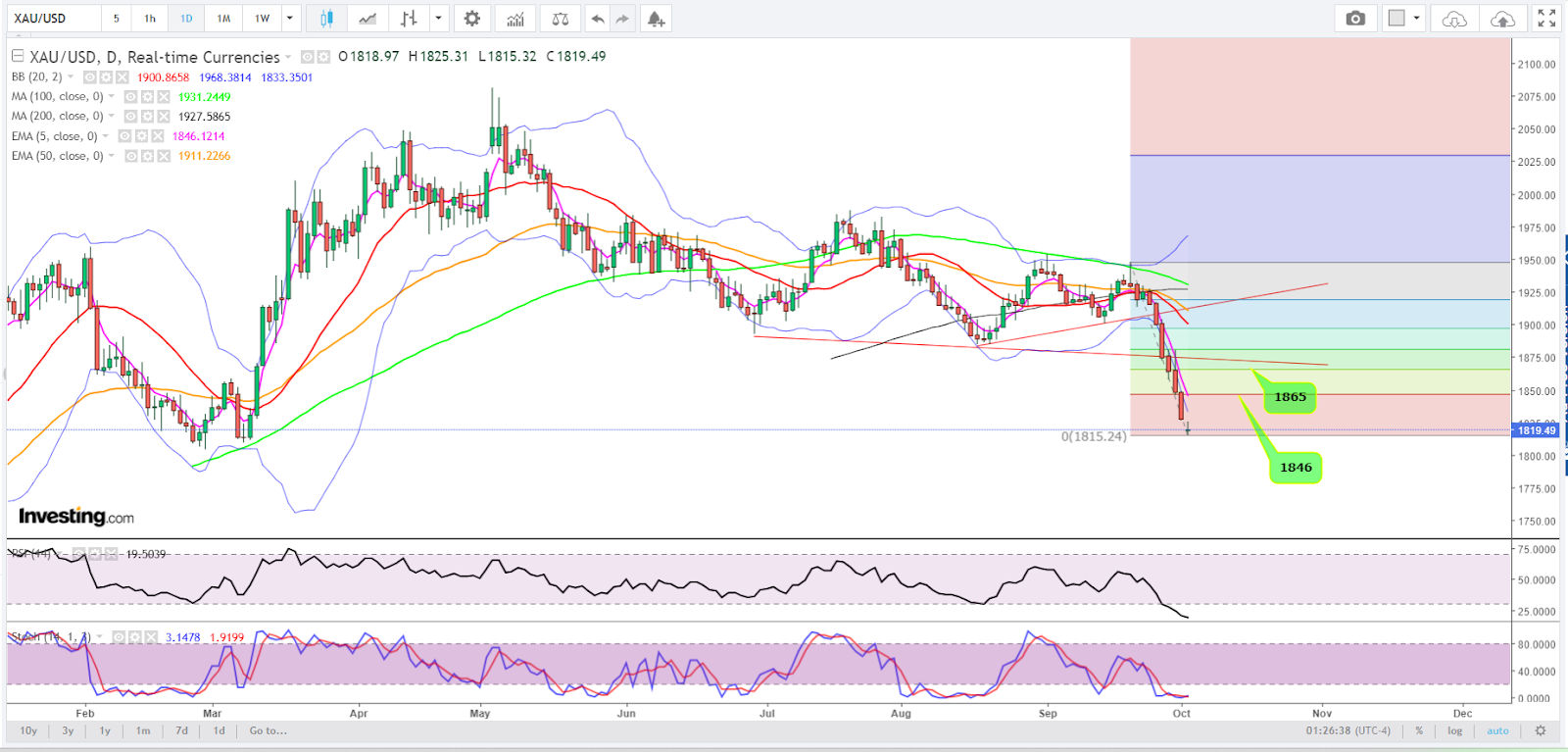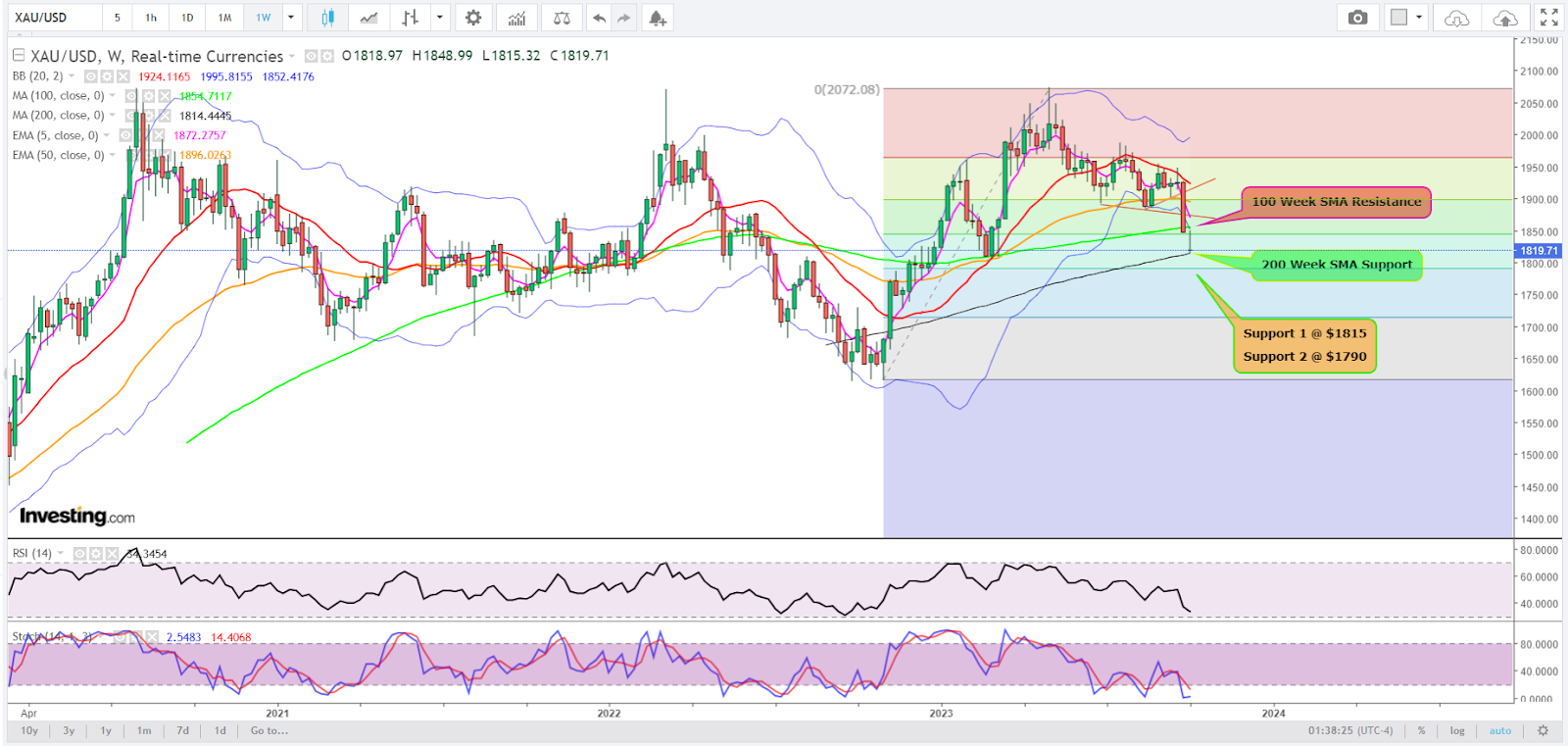- Spot gold reached just $15 from losing critical $1,800 support
- Dollar stays parabolic, with 11-month high vs gold’s 7-month low
- Dollar Index might be eyeing 109, after piercing through much-watched 107 level
- Spot gold’s resolve to stay above $1,700
The world’s supposedly preferred “safe-haven” is not being treated as such as the global economy shudders from the possibility of more inflationary and rate hike pain. Its nemesis instead wears the crown, sitting atop the current market upheaval.
Gold hit new 7-month lows Tuesday, with its spot price hanging on to the ropes of key $1,800 support.
Meanwhile, ‘King Dollar’, as the US currency is called these days, neared a 11-month high on the Dollar Index, or DXY, which measures the greenback against six competing currencies — namely the euro, yen, Canadian dollar, Swedish krona, British pound, and the Swiss franc. 
Charts by SKCharting.com, with data powered by Investing.com
Investors continue their rush towards the dollar at the expense of gold, with the greenback taking on the mantle of super stability against the currencies of challenged economies — giving the sort of assurance one would expect of gold.
Macro strategist James Stanley said the theme of dollar weakness which prevailed for much of the second quarter was probably tested to the brink when bears pushed the DXY below key 100 level support in July.
In a commentary that ran on forex.com, he said:
“That move could not last and what started as a pullback has since turned into a historically clean run of strength in the DXY with now 11 consecutive weekly gains for the first time since September of 2014.
We can see the July breakdown met with failure, which then ran into strength in August and September.”
Having Pierced 107, Is DXY Looking at 109?
Commodities chartist and Investing.com collaborator Sunil Kumar Dixit concurred, saying DXY seemed on an “unstoppable rally”, adding:
“We’ve entered the 12th week of a consistent bullish advance, with DXY finally testing the 107.18 critical zone, which is the 50% level of Fibonacci retracement from the previous major down wave where it went from 114.78 to 99.58. If this zone acts as effective resistance, markets are likely to witness a pull back to the 38.2% Fibonacci zone of 105.39.
On the flip side, if smart money show continues rushing to the dollar at above 107.20, a new leg of the dollar bull run will target the 61.8% fibonacci zone of 109.”
DXY has been on a tear since Friday, reaching heightened frenzy after a number of policy-makers at the Federal Reserve hinted on Monday at another rate hike in either November or December to keep headline inflation under control and nearer to the central bank’s 2% per annum target from a current 3.7%.
Fed Governor Michelle Bowman said she would be willing to support another increase in the central bank's policy interest rate at a future meeting if incoming data shows progress on inflation is stalling or proceeding too slowly. In remarks prepared for delivery at a banking conference on Monday, Bowman added:
“It will likely be appropriate to raise rates further and hold them at a restrictive level for some time. Inflation remains too high.”
Michael Barr, the Fed’s vice chair for supervision, said the central bank will likely “need to keep rates up for some time”.
While US inflation has cooled markedly from the four-decade highs of more than 9% per annum that it stood at in June 2022, a runaway rally in oil in recent months has raised concerns that non-oil producing countries — which make up the bulk of the world economy — will face an onerous burden again as the year ends.
What of Gold Then?
The yellow metal has been moving in almost perfect sync to the dollar, only in the opposite direction.
At the time of writing, gold’s most-active futures contract on New York’s Comex, December, hovered at just under $1,837 an ounce, continuing the bear streak in the yellow metal for an eight straight day in a rout that has already cost longs in the game nearly 6%. 
The benchmark for U.S. gold futures tumbled 4% last week for its biggest weekly decline since the week ended June 11, 2021. Comex gold also wrapped the third quarter down 3% after a 4% drop in the second quarter.
More importantly, the spot price of gold, reflected by physical trades in bullion and is more closely watched by some traders than futures, was at just above $1,821, tumbling in 10 of the 12 sessions.
While percentage losses in both futures and spot were similar, what set the bullion indicator apart was its trough for the day — $1,815.32 — which was just $15 from a test of $1,700 levels. The last time spot gold crumbled beneath $1,800 was in December 2022, when it reached $1,765.32.
Has Gold Lost It Totally? Or Is It At the Cusp of a Bounce?

As vulnerable as the yellow metal looked with each passing day, gold may have drawn its own red line in this selloff, cautions Dixit, chief technical strategist at SKCharting.com:
”If DXY maintains stability below the 107.20 resistance, the potential for spot gold’s further decline below the 200-week SMA, or Simple Moving Average, of $1,815 may be limited.
But also bear in mind that any recovery from the lows will meet immediate resistance at $1,845. Only in clearing through this hurdle, gold will be able to face next challenges of the 100 week SMA $1855 followed by $1865-$1875 and $1888.”
The job for gold bears would be easier accomplished if the dollar keeps to its relentless charge higher.
“If spot gold loses its hold on today’s $1,815 low and the week’s close goes below that zone, expect bullion’s downside to cross the 61.8% Fibonacci zone of $1,790.”
***
Disclaimer: The aim of this article is purely to inform and does not in any way represent an inducement or recommendation to buy or sell any commodity or its related securities. The author Barani Krishnan does not hold a position in the commodities and securities he writes about. He typically uses a range of views outside his own to bring diversity to his analysis of any market. For neutrality, he sometimes presents contrarian views and market variables.
